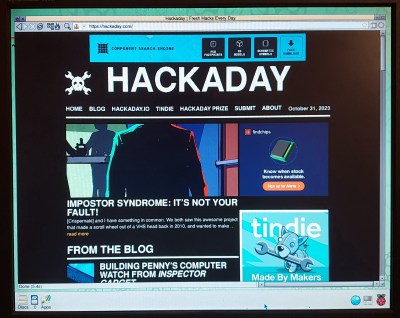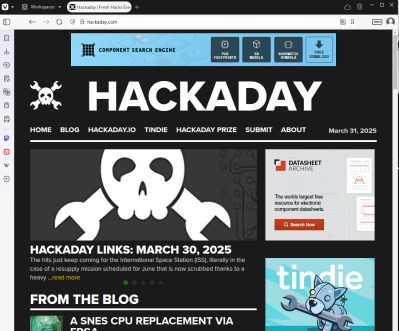Over the history of the Web, we have seen several major shifts in browsing software. If you’re old enough to have used NCSA Mosaic or any of the other early browsers, you probably welcomed the arrival of Netscape Navigator, and rued its decline in the face of Internet Explorer. As Mozilla and then Firefox rose from Netscape’s corpse the domination by Microsoft seemed inevitable, but then along came Safari and then Chrome.
For a glorious while there was genuine competition between browser heavyweights, but over the last decade we’ve arrived at a point where Chrome and its associated Google domination is the only game in town. Other players are small, and the people behind Firefox seem hell-bent on fleeing to the Dark Side, so where should we turn? Is there a privacy-centric open source browser that follows web standards and doesn’t come with any unfortunate baggage in the room? It’s time to find out.
It’s All In The Engine

If you look at the breadth of standards which a modern web browser has to support, it’s clear that writing a web browser is a Herculean task. Many browsers take the route of not trying to implement everything, for example minimalist browsers such as Dillo or NetSurf concentrate only on rendering web pages. For the purposes of this piece we’re looking at full-fat browsers capable of being a daily driver though, and for that a browser needs some very capable software.
Many development teams are not capable of writing such a browser engine, and thus use one developed for another browser. Despite there being many names on the table then, peering under the hood there are surprisingly few options. The Apple Webkit and Google Blink family of browsers dominate, followed by Mozilla Gecko and its Goanna fork, and then by promising bit-part players such as Servo, or the Ladybird browser’s LibWeb. Having so much of the web’s browser software dominated by Apple and Google is not an ideal situation, but it’s where we find ourselves.

So when choosing a browser, the first thing we look at is its engine. Whose ecosystem are we becoming part of, and does that have any effect on us? Within reason all modern full-featured browser engines render websites the same, so there should be little to choose from in terms of the websites themselves.
Having considered the browser engine, next up are whatever the developer uses to differentiate themselves. It’s surprisingly straightforward to construct a bare-bones web browser on top of WebKit, so to stand out each browser has a unique selling point. Is it privacy you’re after, ad blocking, or just following a UI path abandoned by a previous browser? And perhaps most importantly, are you simply departing a problematic developer for one even shadier? It’s worth doing your homework, and not being afraid to try multiple browsers before you find your home.
So Where Did Hackaday Land?

Over the course of writing for Hackaday it’s inevitable that a bunch of different browsers will find their way on to my bench. Some of them like Ladybird or Servo I would love the chance to use as my daily driver, but they simply aren’t mature enough for my needs. Others such as Brave have too much of a whiff of controversy around them for someone seeking a quiet life of open-source obscurity.
As I write this I have a preposterous number of browsers installed on my machine, and if there’s one thing which the experience has taught me it’s that they are much more the same than I expected. In three decades our expectation of a browser has homogenised to the extent that I’m hard pressed to tell between them. How do I pick one, without blindly throwing a dart at a corkboard covered in browser logos?
In the end, I looked for two candidates, one each from the Firefox and Apple/Google orbits. I tried them all, and settled on LibreWolf from the former, and Vivaldi from the latter. LibreWolf because it’s done a fine job of making Firefox without it being Firefox, and Vivaldi because its influence from the early Opera versions gave it a tiny bit of individuality missing in the others. I set up both with my usual Hackaday bookmarks, tabs, and shortcuts, changed the search engine to the EU-based Qwant. I’m ready to go, with a bit more control over how my data is shared with the world once more.
A refugee from the early Web writes…
It’s a fairly regular occurrence, that I will Do a Linux Thing in my hackerspace, only to have one of my younger friends point out a much newer and better tool than the one I know, which I probably learned to use some time in the mid-1990s. I’ve fond looking at web browsers to be in some respects a similar experience even if the browsers are much closer to each other than I expected, because for a couple of decades now I’ve been a Firefox user simply because Firefox was the plucky upstart open-source browser. Mozilla’s previous attempts to take Netscape 6 and make it the only piece of Internet software you needed were horribly bloated, and Firefox, or “Phoenix” as it launched, was an easy choice. Just as my operating system journey taught me about software complacency a couple of years ago, so I’ve now had the same awakening in the browser. The Web will never look the same again.
















Firefox with a bunch of extensions on Desktop. Brave on Mobile. Chrome on both to check how normal people experience the hell hole the internet has become.
And if the rare case occurs I have to design something to be used in a browser I always design for Firefox mobile first, then nudge it just enough it doesn’t look like crap on Chrome Desktop.
I’ve completely stopped using Chrome when they threatened to remove ad blocking. Some sites are pure cancer while trying to shove 372 different ads that eats up over 500mb just to view one recipe. Wowhead site is pretty bad at continuously loading ads (averaging 50mb/min at times) but no other similar site to replace Wowhead.
Firefox seem to be still the best general browser with uBlock Origin. If I needed to check something without ad blocking, Edge is basically Chrome with Microsoft skin
“And if the rare case occurs I have to design something to be used in a browser I always design for Firefox mobile first, then nudge it just enough it doesn’t look like crap on Chrome Desktop.”
I wish that that when you run out of milk you always have enough to exactly cover what you need and that the perfect parking spot is always available at the local store to you.
Absolute legend.
I don’t drink milk (anymore).
And thanks to all the pessimists – are you one? – I usually find a parking spot right at the entrance. But I also avoid peak hours (or overly modern features in browsers).
If the site doesn’t work over lynx it isn’t worth using.
… Didn’t you have to use something other than lynx to post this comment? (Thanks for reminding me of lynx by the way; I’m going to use it a lot more now. Too many file formats allow the creation of arbitrary logic, and sandbox escapes are found somewhat regularly)
Firefox on my MacBook, DuckDuckGo on my phone. Brave only when I need to use Photopea and for confirming a web issue isn’t specific to Firefox lol
Dillo dot org is no longer under control of developers, please see: https://dillo-browser.github.io/dillo.org.html
With the latest “features” that got silently introduced into Firefox (namely collecting and selling my personal information/whatever I do in the browser to god knows who) I cut all my ties with it and switched to LibreWolf. I’m glad I did.
This did not happen.
There was some kerfuffle with some legalese in their privacy policy, but it was massively blown out of proportion (partly due to Mozilla doing a terrible job explaining the change and partly out of normal clickbait hype).
If you want a browser that respects you as a human, including your privacy, and has reliable integrity and security, Firefox is the clear best choice.
This did not happen.
There was some kerfuffle with some legalese in their privacy policy, but it was massively blown out of proportion (partly due to Mozilla doing a terrible job explaining the change and partly out of normal clickbait hype).
If you want a browser that respects you as a human, including your privacy, and has reliable integrity and security, Firefox is the clear best choice.
This never happened, Firefox’s pr is just incompetent. There are other trains to be made at them, but not this specific thing, though I do agree the Lancashire they settled on still needs to change. I can write it for them if they like.
LibreWolf makes about 10 connections to all kind of telemetry services just by starting it. Including mozilla.
“Telemetry free” – my ass.
Does it actually make the connections, or are the selections indicating “true” in the menus? Going out on a dangerous limb here, the collective unconscious of various online posts says that it’s compiled with telemetry inactivated but may display other selections in the menu.
Here’s an example of the discussion:
https://www.reddit.com/r/LibreWolf/comments/ztz7kx/problem_with_librewolf_telemetry/
It actually makes these connections before asking for permission or letting me to configuration.
This can be reproduced and monitored with Little Snitch. Install, start and off you go..
LibreWolf 136.0.4-1 connects just to push.mozilla.com, which can be disabled via dom.push.enabled in about:config
privacy is obsolete and compliance with the defacto standards is the primary function of a web browser, so i run stock chrome with a minimum of plugins…”Blank New Tab Page”, and “Don’t add custom search engines.” and i always wind up hunting for the theme that “looks like it used to look before i upgraded”. and i run it under an LXC container so every time i update, it’s a fresh install with exactly the current set of libraries to satisfy its dependencies, isolated from the churn of library updates for other programs. and i only customize a bare minimum of the settings. the only one i really care about is adding my own search engines. and i run it over VNC so i haven’t let a browser upgrade obsolete a laptop in 15 years, plus it doesn’t hurt the battery life or thermal sensation.
i went through so many experiments with adblockers and other browsers (big and small) and so on, and i never found anything that worked very well in the moment…and whatever i settled for would then always get broken by forces outside of my control. stop swimming and let the current carry you.
Hi “Rick” – based on your comments to date, please delete your account and seek help.
The web is unusable without a good ad blocker such as uBlock Origin, which can no longer be used with Chrome. DNS based ad blocking just isn’t enough.
i’m surprised to report that i do not miss ad blocking. there are websites with overwhelming ads, but they are of a low quality and i mostly don’t miss them…whether i can eradicate the ads or not, i am always in a hurry to stop using them. there’s definitely the bummer where you realize the whole computer (which is really a mammoth resource, imo) is dragging because of a tab i accidentally left open that is full of bloatware…but the surprising thing is that, for example, google’s official android SDK documentation is actually the worst offender i’ve met yet, and it doesn’t even have ads or any features beyond html 1.1!
Then, I’m, and wish to stay, an old man in it’s internet cave.
Aaaand that’s how you ended up with Internet Explorer situation back in the day.
IE is widespread and allow that (that is not in the standard), so I will use this function anyway and either don’t care about any other browser (and users), or spend an ungolly amount of time to make do a home made solution.
All of that to display a colored scroller bar.
More seriously, if you think that way, then, no need to have anything developped for consumer linux because it’s not mainstream.
Oh well, everyone have it it’s way, I’m just glad some don’t think like this.
But you probably represent the consumer point of view fairly well.
oddly, consumer linux is extremely mainstream…android and chromeos. but yes at some point when i want a least common denominator web browser, i wind up using a closed device. i even occasionally used IE. god i’m glad IE is behind us.
but the thing is, chrome won. chrome won. chrome won. accept it. we’re living in a specific universe, where chrome won, and it isn’t that bad in some ways. if it was that bad, maybe it wouldn’t’ve won. IE didn’t win!
and you can go to a lot of trouble to avoid chrome, and you won’t really get a great experience. sigh.
It doesn’t matter, the other options still exist and get development and they should be used when they’re are issues introduced by Google or whoever can’t be resolved by forks.
Your perspective is just complacent, not better.
My experience clearly differs from yours. I run Ungoogled Chromium only for Jitsi sessions; for everything else I use Firefox.
Granted, I’m not an average user – I’ve done research, installed a lot of extensions, and changed a lot of about:config entries. But as a result I have a daily browser experience which beats the pants off Chrome and its derivatives while simultaneously honouring my privacy to a much greater extent. So I really don’t understand your “Chrome is inevitable and I welcome our Google overlords” stance.
Running pi-hole on my raspberry pi makes my DDG & chrome browsing experience better
This is genuinely illiterate and suggests you should not be allowed to handle anyone’s personal information. Privacy is more important than ever, and you just don’t know what actually losing it looks like because others are protecting you.
As for adblocking, plenty of solutions do a good job and even partial ones are helpful, unlike your suggestions.
The one which allows uBlock Origin… so Firefox or one of it’s clones.
You misspelled Brave. Devs said they’ll keep üBlock origin running on their Chromium bulld as long as possible
Fun choice, crypto shit stuffed in my face or my data sold behind my back…
You forgot to add AI bullshit that keeps appearing even when disabled to crypto shit…
I remember the brave browser viral marketing campaign on 4chimps. “Come home white man.”
Everytime i see someone using brave, i think “Do you feel at home yet white man?” Very cringe.
sorry to post this, but this is just my experience…
There’s a whole world of quirky browsers. I resuscitated the old “Midori” browser based on Vala (a language you’ve never heard of) on Webkit2GTK. A corporation had taken over the name, so it’s now Andy’s Webkit Browser for Linux: https://awbfl.org/
(Posted using AWBfL.)
That is neat, thank you for reviving it!
I was introduced to Midori by the Raspbian OS circa 2012, used it in kiosk mode for a project, and used it on my laptop for some time, as it was the most lightweight browser that could still run Netflix.
Oh, nice. I had forgotten about this one, but there is a string need for a mirror ground between support for everything and “fast and light”.
Any reason “Midori Browser” or a colour variation “kimidori” or “komidori” (though also apparently the name of a sumo wrestler, an eSports smash player, a YouTube creator, and a pop star, so maybe not).
Firefox here on all Linux systems at home. With two ad-blockers installed and a pi-hole in operation to hopefully keep the adverts and tracking down to a minimum. Also turn off the telemetry in the firefox settings (if that actually does anything). Use duckduckgo for my search engine. Don’t use ‘chats’….
Rarely use the browser app on the Apple phone…
Pi-hole starts to be useless as they make direct IP connections, for example M$ does that. Also some devices use their own DNS or use 8.8.8.8 without obeying to DHCP server one.
Firefox makes lots of telemetry connections to multiple addresses.
Not useless. Just less affective, but the pi-hole stats show it is still very ‘useful’ in blocking traffic as I browse :) . I realize for every good idea, there is someone/entity trying to get around it… So it goes. A lot like malware … a never ending cycle of checkings ‘for’ and the creators ‘of’…
We do the best we can … without being fanatical about it.
Windows free here (at home) for many years now BTW. Haven’t missed it either.
I have rules set in my router to redirect 8.8.8.8 and 8.8.4.4, etc etc back to the pi-hole.
Helps mitigate the sneaky direct connections, I think….?
Does nothing to direct connections, which wouldn’t use DNS at all.
There is usually a setting for forcing the issue.
If you are boxing or redirecting outgoings TCP and UDP traffic headed to specific IPs it does. I do want to point out that using dnssec for your own braising is a good idea though.
One thing you aren’t going to block is DNS over Https, at least not without blocking the host they are using.
As r lark mentions it’s not “useless” at all, but I want to reinforce that it blocks a lot of traffic on a daily basis and often you don’t even know until you try to use the same services outside. It’s just one more helper and it’s a good one.
The short life of the site-specific browser idea has left me using many, many different browsers at once. Vivaldi is probably my favorite of the lot for regularly trying out new ideas and generally letting me opt out of features I don’t want. There is a little risk of becoming bloatware with their approach, but so far so good.
I do this too, One browser per objective usually.
Brave Browser (with all their web3 and AI nonsense disabled) + Ublock origin is my go-to for low issues ad free browsing.
IMHO Floorp is better than LibreWolf, Thorium is really good too.
Firefox, plus on android you get all the extensions as well.
Use Brave with some settings disabled. Won’t touch Chrome or anything from MS. Firefox lost me when Mozilla decided that all political opinions that don’t match theirs needed to be eradicated from the internet and anyone with those opinions needed to be tracked and monitored.
Those are 2 separate issues, and the issue of political beliefs was less “any opinion that doesn’t suit us needs to be eradicated” and more “due to public demand we’re going to stop actively paying the guy who sends tons of money to a political campaign to suppress the fundamental human rights of 10%+ of all people”, but if you feel the need to use strawmen instead of actual arguments, you do you
$1000 is hardly “tons of money”.
Redefining marriage is not a fundamental right. And it certainly isn’t 10% of the population. More like 1-2%. And the majority of people were against it at the time.
This is pretty incoherent, and Mozilla isn’t suppressing anyone. It’s a legal issue. Not that I don’t have complaints about them, but it’s mainly how their priorities are a mess and they don’t understand how people like you will misinterpret what they have said. As it is they are the most primal focusd so we get to deal with their incompetence.
Firefox on desktop and Android, uBlock Origin, and just accept that Mozilla will be imperfect. The rumours of their heel turn are exaggerated IMO.
I think that’s just wishful thinking. They are in a lowest possible maintainance mode and just milking everything before it inevitably dies. Both Firefox and Mozilla. Brave with they their crypto AI bs looks more trustworthy than Mozilla terminally ill while being sucked out by corpovampires.
Mozilla is the organisation that makes Firefox. There is no “both”, it’s one org. And their management has a track record of being incompetent while the engineers are pretty good, but often unwilling to consider doing things they don’t want to.
This leads to massive over expenditures for marketing and weirdly unresponsive public interactions with management, and entire projects getting cut when a while developer retires, losing popular features and potentially years of work and monetary investment.
Their current money issues are entirely the bad management, and the lack of focus and useful updates is the result of current Devs getting sucked into the idea being more chrome-like will gain market share rather than solving problems end users report. Brave is not more trustworthy.
Chrome/Chromium is my browser of choice, as Firefox does not support WebUSB/WebSerial.
I just open chromium whenever I need that functionality. No desire to throw the baby out with the bathwater.
Why would you use only one web browser?
Netscape diehard as it simply was the best, then when Netscape stopped innovating it was Opera till forever then came Chrome. Firefox always seemed clunk. Keep wanting to try Brave but my hundreds of windows with each several to hundreds of tabs makes the migration daunting. Yes I’ve bookmarked the lesser of the lesser used tabs but still….
I’ve recently been surprised by how good Gnome Web is, it’s WebKit based (of note since the article doesn’t pay enough attention to this – WebKit is, particularly these days, separate to the Blink engine Chromium and derivatives use), has a very simple but solid interface, and has a built in ad blocker without all the crypto nonsense that Brave bakes in.
It crashes too often for me, I currently have it set up to store Notting and launch in incognito, as the “default” for URL links from mail or documentation, but even then there are a surprising number of pages that just don’t load correctly.
I use whatever runs uBlock Origin. Now it’s Firefox, but with those new shady policies i maybe get some libretised fork of it.
I’ve recently moved to Zen (https://zen-browser.app/) which is Firefox based. I’m really enjoying the interface. I like the fact that it’s helping to split the Blink monoculture. Unfortunately Gecko has it’s issues – some longstanding – like rendering gradients.
In what context? I don’t do much web dev any more, but I have made plenty of CSS involving gradients that work fine on all modern browsers. And most of that has been similar for upwards of 15 years. If you are really dealing with gradients that doesn’t work it seems most likely the developer isn’t using standards at all, and is instead using Blink specific code.
Zorin OS 17.3 just switched from Firefox to Brave. This is how co-founder and CEO Artyom Zorin explained it: “The issue around Firefox’s policy changes was originally raised by community members on our forum – as well as other users contacting us directly. Because privacy is a fundamental value of Zorin OS, we had no choice but to take our users’ concerns about this seriously and be proactive about protecting their data and security. Any browsers that didn’t respect users’ privacy – like Google Chrome or Microsoft Edge – were initially disqualified from our shortlist. As we aim to maintain the Free and Open Source nature of Zorin OS as one of our core values, we weren’t able to go ahead with browsers that were wholly or partially proprietary such as Opera and Vivaldi.”
He then explained that he wanted a browser with a support team that could quickly respond with security fixes, and provide long-term support: “Some alternative browsers – such as LibreWolf, Waterfox, Floorp, and Ungoogled Chromium – appear to be developed and maintained by small hobbyist teams, and in some cases by individuals.”
This last point would not have been an issue for me, but he feels a responsibility to his users. He disabled some Brave-specific features not related to actual browsing, such as cryptocurrency, Brave Rewards, Wallet, Leo AI, and Brave News. Politics was not a factor, which is a huge plus for me. When people start talking politics here, you lose my respect immediately. Hacksters only!
Much of the Firefox thing is overblown. Not that I don’t believe they should change the language, they should. But the problem in this case is management incompetence, not profiteering. I hope the community is able to get them to sharpen up, but between the reply and their latest hire they still don’t have any idea what is happening or how to manage their finances.
Re-politics, it may suck but everything is inherently political, there’s no getting away from that. What a policy like “no politics” actually sure in practice is cultivate a space where only people that can abuse that environment and enjoy it when others do too end up hanging out, this is the opposite of what you want. This effect is referred to as unintentionally “making a nazi bar”.
Moderation is tough, and it sucks to do. Find people you can trust to be even handed and will work within the spirit of your rules, and are diligent enough to document well so they can get rid of the real problem users.
One of the issues I ran into with firefox long before the recent drama, was the lack of new features like webgpu support which has been around on chrome for a while now.
The issue with chrome of course is they’re determine to prevent ad blockers like ublock origin.
What I’ve moved to is opera, I don’t know if it has privacy issues but it is a chromium based browser so has the latest features and they’ve said they’re going to modify the chromium code base to still support uBlock Origin in the process.
Isn’t Opera partially Chinese owned now?
Or am I mistaken?
That’s what I have heard as well but am too lazy to verify the rumor mill. If that’s true though I’d take any privacy promises with a big grain of salt
It’s not a rumour, they were purchased by a Chinese led investment group.
Firefox when possible, Chrome/Edge when Firefox, sadly, does not work (productivity sites mostly).
Chrome/Safari on Mobile (iOS/Android), really the only choice, since anything else on mobile is just a reskin.
Android isn’t reskins, Firefox and the like are their own engines. iOS on the otherhand is just reskinned Safari (although this is changing in the EU)
Re:reskins, You are thinking of iOS, where browsers aren’t allowed, so every browser is Safari mobile with a skin Android has never been like that. The OS has a chrome based “web view” used for viewing pages from email, but all browsers are mobile tuned versions of their desktop equivalents.
You can even install extensions on mobile Firefox, though they might break and the UI might prevent you from setting them up properly. I personally use adblock this way.
I will only use the portable version of a browser. If there’s no portable version it’s not worth my time.
So all it takes is for the corporate sector to plant stories about something being “problematic” and the browser like Brave becomes untouchable?
Floorp with Sidebery for a very different experience.
Chrome is spyware simple as.
I used Firefox back in the day.
But I switched to Brave not so long after it started (one year maybe?)
Yeah, the crypto stuff can be turned off easily.
But what I loved about Brave was the “let’s try to make the internet better”.
For exemple, Brave automatically give a link to the internet archive when a page doesn’t load.
Also, it have it’s own torrent client, or IPFS client/mirror.
And that’s really what I love about it.
I only regret that they didn’t shove a gopher explorer somewhere = P
As for what I hate, well, the chrome engine for one.
But also, I use too much tabs, and I really miss the simple mouse scroll to move from tabs to tabs from firefox.
But let’s be honnest, the perfect something don’t exist.
So does the perfect browser.
I use an old Windows7, and I can’t update, so I’m stuck with an old version.
I use supremium when I need the last chrome stuf, mainly for Discord or things like that.
But the daily is Brave.
I still have my old firefox, with it’s thouthands of tabs…
I clean it a bit from time to time, but it fills my RAM badly when opening tabs to see what’s inside and what’s worth of keeping.
Thanks for reading my blog, have a nice day!
Firefox still supports your Windows 7:
https://support.mozilla.org/en-US/kb/firefox-users-windows-7-8-and-81-moving-extended-support
When their support ends later this year, you can switch to SeaMonkey for another year or two of support (for as long as they continue in their 2.53.xx series):
https://www.seamonkey-project.org/doc/system-requirements
IMHO, one of the biggest “anti privacy” and “anti security” challenges which have been exposed recently, has been DoH (RFC 8484). I do feel that its touted strong points of “Improved Privacy” and “Enhanced Security” lean strongly towards advertising networks and social media properties, but not end users…
From a security standpoint, DoH can effectively walk around any DNS filtering or black holes which have been put into place by users (and/or responsible businesses). It makes it much more difficult to effectively/efficiently filter things at the edge of your own network(s).
There are some workarounds, like using trusted certificates to inspect/manipulate the secure connections at the network edge. The other is to push out a browser policy to disallow DoH. But these are extra “things” to manage, consider, and monitor.
Based on comments, my approach to DNS is to disallow egress public DNS queries. The only resolver is my gateway which performs inspection and filtering.
Your thoughts?
Chrome and tons of extensions was my substitute for an os.
Now that most of extensions don’t work anymore I switched to Brave.
I quitted firefox when they diverted funds to promote leftist propaganda rather than work on the browser (looks like it’s getting better those days)
What? No one likes Pale Moon? Forked from Firefox (like Librewolf) before it went shady and also supports ad blocking.
Been running Vivaldi as my mobile browser for several years. Apart from some quirky bookmark behaviour its been a very good experience
I leaned about Brave a few years ago and haven’t looked back. I was a long time Firefox user…
Brave on everything, now.
I sometimes have to open Edge or Safari but my main browser is Brave.
The trouble with LibreWolf is that they don’t tale it all the way – ie way isn’t there an off button for their outgoing connections? Each one of the things listed below should be off by default..
“Does LibreWolf make any outgoing connections?
Yes, but they aren’t in any way privacy invading and they were carefully evaluated. Specifically they are needed to fetch and update the blocking lists used by uBO, Tracking Protection and certificate revocation, which we considered more important than disabling all outgoing connections, especially ones that are harmless. LibreWolf also maintains an open WebSocket towards Mozilla’s push server to check wether you have received push notifications from websites you have subscribed to.”